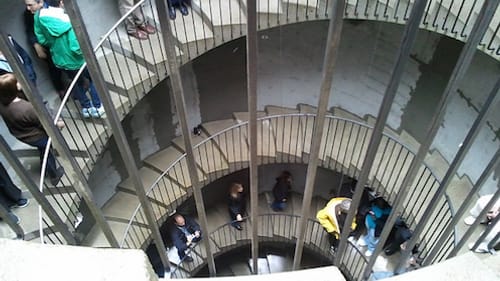Stay in the Loop
BSR publishes on a weekly schedule, with an email newsletter every Wednesday and Thursday morning. There’s no paywall, and subscribing is always free.
Learning to listen
Pauline Oliveros: A remembrance

Pauline Oliveros died at age 84 on Thanksgiving morning, ending one of the most adventurous creative lives of the 20th and 21st centuries.
She once said to me, “You know, Joseph, you can hear better with your shoes off.” She didn’t mean me; she meant us. She was right. At least I think she was right, even though the notion that I did indeed hear better with my shoes off might have been an aural illusion, something I wished were true.
A close collaborator
At that time, the Relâche Ensemble and I were collaborating with Oliveros at the Yellow Springs Institute for the Arts and Humanities in Chester County where she was composer-in-residence at a program called Six Saturdays. During that week, the musicians worked with her to create a new piece titled The Well. It highlighted her unique ability to develop a work through close collaboration with musicians and audience.
The Well was performed throughout the United States, Europe, and Japan by Relâche and recorded for the German label Hat-Art Records. During that transformative week, a friendship was cemented that helped me to better understand how to shape future commissions of new works. Utilizing her ideas, I learned to craft a truly collaborative musical experience. Over the years, Oliveros visited Philadelphia many times, usually appearing in concert with Relâche.
Until the end she continued to compose and perform her music. Fiercely independent, she combined a passion for artistic expression with social issues that she believed essential for a just and equitable society. A staunch feminist, she refused the label of “woman composer.” She was a composer, period, though her musical scores were not those one might associate with the “great composers.”
Yes, she could notate her ideas but her methodology was more narrative in spirit. In her oft-quoted, seminal work Sonic Meditations, a set of 25 text-based instructions, she wrote “Take a walk at night. Walk so silently that the bottoms of your feet become ears.”
Many memories
Her canon was diverse, from early work with electronic/tape music (as a founder of the iconic San Francisco Tape Music Center in the early 1960s) to her later democratically ordered, gender-challenging meditative works for musicians and non-musicians alike, her music flowed with a positive message. She wrote, “I bid farewell not only to the music of the 19th century but also to the system of polite morality of that age and its attendant institutionalized oppression of the female sex.” Damned if she didn’t!

I was one of many “new music” artists who “got” Oliveros. And she got us. She could be tough while defining her artistic position. Like many professions, the world of the arts can be like arm wrestling. Blood is seldom spilled but the pain can be brutal. Oliveros was never brutal in her dealings with others, but she could be difficult. That was okay; she knew what she wanted and pursued her vision. She always had a point of view. To me, that was an essential reason for choosing her as a collaborator.
My long friendship with Oliveros has yielded many memories. At the 1984 New Music America Festival in Hartford, Connecticut she performed with my close friend, the magnificent accordionist-composer, Guy Klucevsek. It was a mind-blowing 60 minutes of pure, absolute artistic virtuosity. Afterward she said to me, “Boy, Guy can really play.” Then Guy told me, “Damn, Pauline really nailed it.”
During a tour of Japan, Relâche played The Well with a group of traditional musicians versed in the ancient music of the Imperial Court, known as Gagaku. Later when I played the recordings for her, she responded, “Wow. Those guys sort of got it, didn’t they? Tuning was different in places but I kind of like it.”
Arriving late at my apartment in Germantown for a short residency with Relâche, she told me, “Those were not good directions, Joseph. I damned near wound up in Baltimore.” Humbled, I cooked her a great meal of gumbo.
Deep listening
After I left Philadelphia I saw Oliveros only at conferences and other new music events, but we kept in touch via email and sometimes on social media. I’ve kept abreast of her work with the Deep Listening Institute she founded and nurtured for many years. It is now the Center for Deep Listening at Rensselaer Polytechnic Institute.
These days I no longer listen as much to the music that consumed my life. Like any musician, I listen to music structurally, applying the intense training I had in western musical praxis to a variety of musical styles. In some ways, I’m a freer listener now. I no longer have a professional agenda to build new organizations and I no longer wish to be captain of the team. After learning of Pauline Oliveros’s death, I gathered up all my recordings of her music and listened. I listened deeply. And it resonates deeply in a world overrun with popular music aimed at those who wish not to listen deeply. Her recorded music will continue to sing of the body and through the body. Especially through one’s feet.
Sign up for our newsletter
All of the week's new articles, all in one place. Sign up for the free weekly BSR newsletters, and don't miss a conversation.

 Joseph Franklin
Joseph Franklin